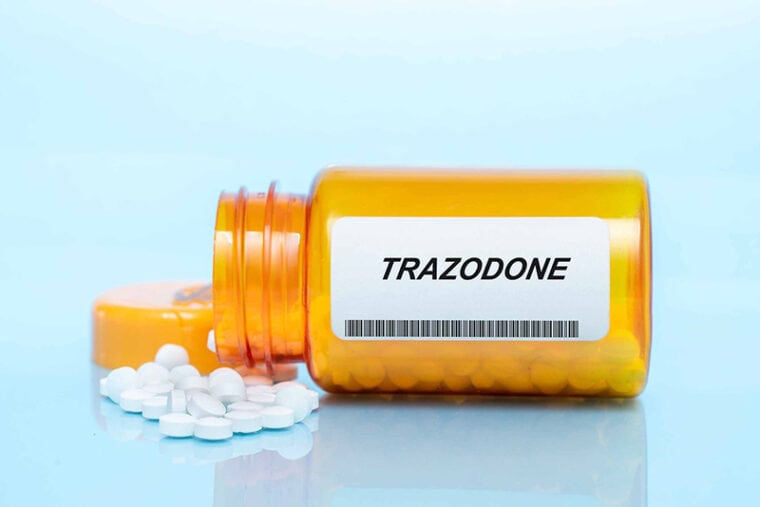
If you have a dog with anxiety, especially with storms, fireworks, and/or travel, your veterinarian may have prescribed Trazodone. This medication is commonly used in veterinary medicine for short-term anxiety and/or stressful events. It’s a great option for those dogs who are not typically stressed all day long, but only need temporary anxiety-relief.
Continue reading to learn more about Trazodone, its potential side effects, doses, and most common uses.
What Is Trazodone?
Trazodone is within the antidepressant class of drugs when used in humans. In dogs, we commonly classify it under “selective serotonin-reuptake inhibitor” (or SSRI).
SSRIs help to keep serotonin levels elevated in the brain. Increased serotonin in the brain will lead to less stress, less anxiety, and a calmer demeanor. SSRIs help to decrease removal of serotonin from the brain, causing the levels to be elevated for longer.
Trazodone is most commonly prescribed for short term use in dogs. It’s great for dogs with firework and storm phobias, anxiety at the vet or groomers, or to help keep excited pups calm after a surgery. Trazodone can be given long term, but likely wouldn’t be your veterinarian’s first choice.

How Is Trazodone Given?
Trazodone is given in oral form. Trazodone comes in numerous different strengths, typically pills but sometimes as capsules. Trazodone can be made into a liquid, but typically this is done through a compounding pharmacy. A compounding pharmacy is able to make many medications, such as Trazodone, into different forms to help make administration easier. Your dog may do better with a liquid, flavored liquid or potentially flavored tablets. All of these options would need to be discussed with your compounding pharmacist.
Trazodone is typically given prior to a stressful event. You will want to try and give it to your dog at least one to two hours prior to a stressful vet appointment, the holiday fireworks, or a thunderstorm. It is best if given with only a small amount of food, allowing it to absorb into the bloodstream quicker. Trazodone does not necessarily need to be given with or without food, but it can sometimes cause an upset stomach at higher doses.
The good news is there is a fairly large, safe, dosing range for Trazodone and dogs. This means that your veterinarian may give you a range that you can administer. Depending on what makes your dog the most stressed—nail trims, fireworks, car travel—your veterinarian will be able to determine which dose to give your dog and when.
What Happens If You Miss a Dose?
Trazodone is not a medication that needs to be or is commonly given long term. It is most commonly prescribed for short term sedative and anti-anxiety effects. Therefore, if you miss a dose, your dog will unfortunately just be worked up, anxious, and/or stressed out.

Potential Side Effects of Trazodone
Unfortunately, dogs may have varying sedative effects on Trazodone. Some dogs only need to receive a very low dose and will be asleep for hours. While others can receive the high end of the recommended dose and still be anxious, stressed, and/or destructive.
Trazodone can sometimes cause nausea, vomiting, and diarrhea. This is most common at higher doses. If your dog is new to the medication, you may want to start at the lower end of the dosing range until you know if they will have any GI upset.
Very rarely we can see serotonin syndrome with Trazodone. This is when the serotonin levels in the brain actually become too high. Your dog would need to be hospitalized, monitored, and started on a different medication to counteract the effects of this type of toxicity.
Because Trazodone is an SSRI, your veterinarian will need to be careful about prescribing it to your dog if they are on other medications. Combining different kinds of sedatives can be harmful and increase your dog’s risk of developing serotonin syndrome.

Frequently Asked Questions (FAQs)
Can my dog still be anxious after getting Trazodone?
Yes. Unfortunately, not all medications work the same in every dog. Some dogs will be very sedate on a very low dose, while others can receive extremely high doses and have very little effect. Always speak with your veterinarian about proper dosages and potentially combining them with other medications if needed.
What if my dog is on other medications for sedation?
You will definitely need to discuss the use of Trazodone with your veterinarian. Some medications will cause harmful increases in serotonin with Trazodone. Others may increase the effect of Trazodone, causing profound sedation.
Can I get Trazodone at a human pharmacy?
Trazodone is used in both humans and dogs. Your local pharmacist likely has the medication. However, your veterinarian will still need to provide the prescription of Trazodone for your dog after they have had a physical exam. Trazodone is not a medication you can buy over the counter.
Conclusion
Trazodone is considered an SSRI in dogs, and is most commonly prescribed for short-term anxiety and stress relief. Trazodone is given orally and comes in a variety of strengths. You may even be able to get the medication compounded to make administration to your dog easier. Trazodone has a large dosing range but care needs to be taken with other medications and at higher doses.
Featured Image Credit: luchschenF, Shutterstock







